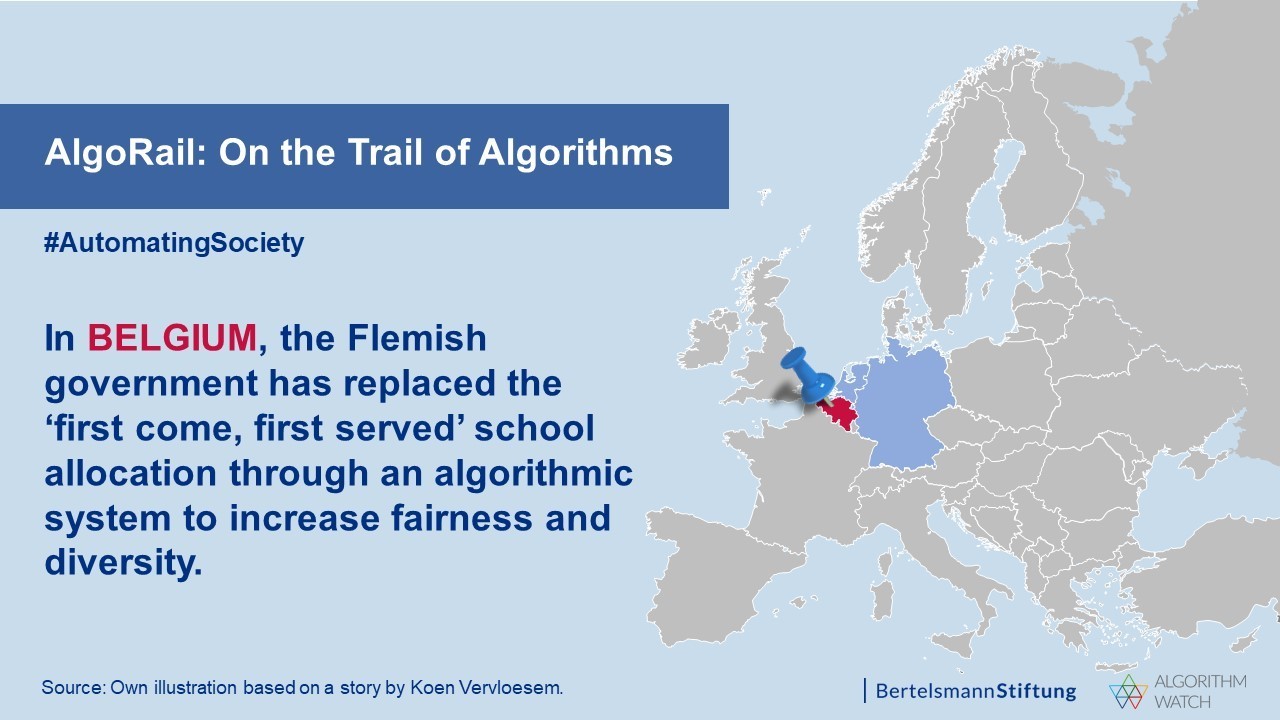In the Flemish part of Belgium, camping became an icon of injustice. Parents slept in front of top schools in order to be the first in line to enroll their kids. This unnerving and unfair practice was stopped when the government introduced an algorithmic system to allocate school places. At the third stop of our AlgoRail through Europe, Koen Vervloesem explains the functionality and how the change was perceived.
Belgium has a long tradition of free choice of school, but in recent years this has met its limits. As a result, in many neighborhoods parents were spending several nights in tents outside their preferred school, because the rule was “First come, first served”. This doesn’t seem to be a fair situation: not every parent can take a week off from work to get their children in their preferred school.
A central online system
In response to this situation, the Flemish government implemented in 2018 a mandatory central online system for regions or cities that have a capacity problem in their schools. This system uses an algorithm that decides in which school a child can enroll. After the decision, a child gets a ‘ticket’ to the school and can enroll in the school with this ticket. If a school does not use the central online system, it cannot refuse a student; if it uses the system, it has to follow the algorithm.
But how would one algorithmically assign students to a school in a fair way? One evident prerequisite for a school enrollment algorithm is that it should assign as many children as possible to a school of their highest possible preference. On the other hand, the system should disappoint as few children as possible, meaning that the number of children that cannot enroll in any school in their list of choices should be minimized. Furthermore, families shouldn’t be able to ‘game’ the system with a clever strategy.
Exchanging tickets
This algorithm was strategy-neutral, but it had one big issue: one child could get the first choice of a second child while the latter also received the first choice of the former. When both could exchange their ticket, they would be happier. However, exchanging tickets wasn’t allowed as the whole point of the central registration system was to make the system fairer. If students could exchange tickets this would give a strong advantage to families with a big social network.
Since, however, changes could improve the number of students assigned to their school of preference without disadvantages, these automatic exchanges where added to the algorithm in 2019.
Disadvantaged students
There is another issue related to school choice: social segregation. The Flemish government decided to lessen the social segregation by making classes more heterogeneous. The government originally devised a system of “double quota”: schools should delineate free places in two groups, one for disadvantaged students and one for privileged students. This social correction should lead to a more diverse social mix.
Each school must have a given percentage of disadvantaged children, which they set in collaboration with other schools from a district. The school’s available places are assigned independently to disadvantaged and non-disadvantaged children. Only when all children of a group are assigned a place, and if the school still has free places reserved for that group, are students of the other group allowed to take these places.
The decision was controversial. In an agreement on 7 September 2018, the Flemish government decided that elementary schools would keep the double quota, but secondary schools would not have to.

A standard algorithm
The algorithm goes roughly like this: First, for each school in their list of preferred schools, students receive a random rank. After this, each school has an ordered list of students, numbered from low (they get the place) to high (they only get a place in the school if there are enough places). The school gives as many tickets to students as there are available places.
Now, if a student gets a ticket for more than one school, only the ticket for her first school of preference is kept. The other schools now have an extra free ticket that they assign to the next student on their waiting list.
When there are no more students with multiple tickets, there is a next step: optimization. This is done by exchanging tickets between students that have each other’s better choice. A similar optimization happens on the waiting list.
Only then are the tickets communicated to the parents, together with the place on the waiting list of their higher choices. With these tickets, they can enroll in their school.
Whilst the algorithm seems to work fine, there are always other solutions possible. However, no solution is perfect, so it’s just a matter of weighing pros and cons, It is a political choice. For some experts, strategy-neutrality is holy, while others prefer the best possible result for each student.
In 2019, the decree that obligated the central online system for schools was revoked and the Flemish government is working on a new version.
School commute
For secondary schools, one important factor that the algorithm doesn’t take into account when assigning a school to a student is the distance from home to school. This is an issue in bigger cities that attract students from far away.
“If the capacity of our schools can’t be improved, I’m in favor of including the distance between home and the school as a criterion in the algorithm”, major of Leuven Mr Ridouani said. This means that students from Leuven and the neighboring municipalities would take precedence over students who commute to Leuven from much farther.
Pursuing dreams
Another problem is that a preference is not always ‘just’ a preference, especially in secondary schools. In Ghent there’s only one school where you can study sports, more specifically football. If a talented student who wants to become a top footballer doesn’t get the first choice, he or she can’t pursue this dream.
That’s it for this third stop of our AlgoRail through Europe, on which we want to learn more about how algorithmic systems are used in our European neighborhood. Whilst school has just ended for the summer in many places, we are next going to the isle.
This story was shortened by Julia Gundlach. The unabridged story was published on the AlgorithmWatch website.
The blog series AlgoRail is part of the Automating Society Report 2020 by Bertelsmann Stiftung and AlgorithmWatch, which will be published this fall and is coordinated by Dr. Sarah Fischer. In addition to journalistic stories like this one, the report gives an overview of various examples of algorithmic systems as well as current debates, policy responses and key players in 15 countries. A first issue of the report was published in January 2019.
This text is licensed under a Creative Commons Attribution 4.0 International License



Write a comment